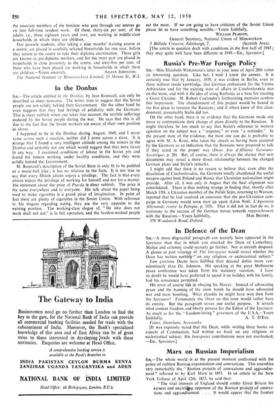In the Donbas
SIR,—The article entitled In the Donbas, by Jean Rounault, can only be described as sheer nonsense. The writer tries to suggest that the Soviet people are not solidly behind their Government. On the other hand he even suggests that they had feelings of solidarity with the Germans. This is sheer rubbish when one takes into account the terrible sufferings endured by the Soviet people during the war. He says that this is all due to the fact that the Soviet workers are aware of their own position as slaves.
I happened to be in the Donbas during August, 1949, and I never came across such a reaction, neither did I come across a slave. It is strange that I found a very intelligent attitude among the miners in the Donbas and certainly not one which would suggest that they were slaves in any way. I examined conditions of labour in the Soviet pits and found the miners working under healthy conditions, and they were solidly behind the Government.
M. Rounault's description of the Soviet State is only fit to be peddled as a music-hall joke ; it has no relation to the facts. It is not true to say that every fiftieth citizen enjoys a privilege. The fact is that every citizen enjoys the privilege of working for himself and not for a master. His statement about the price of Pravda is sheer rubbish. The price is the same everywhere and to everyone. His talk about the paper being used to make cigarettes is a grand piece of imagination. In point of fact there are plenty of cigarettes in the Soviet Union. With reference to his slogans regarding eating, they are the very opposite to the existing position. The working-class slogan of, " He who does not work shall not eat," is In full operation, and the hardest-worked people eat the most. If we are going to have criticism of the Soviet Union please let us have something sensible.—Yours faithfully,
WILLIAM PEARSON,
General Secretary, National Union of Mineworkers 5 Hillside Crescent, Edinburgh, 7. (Scottish Area). [The article in question dealt with conditions in the first half of 1945 ; they may quite well have been different in 1949.—ED., Spectator.]






































 Previous page
Previous page